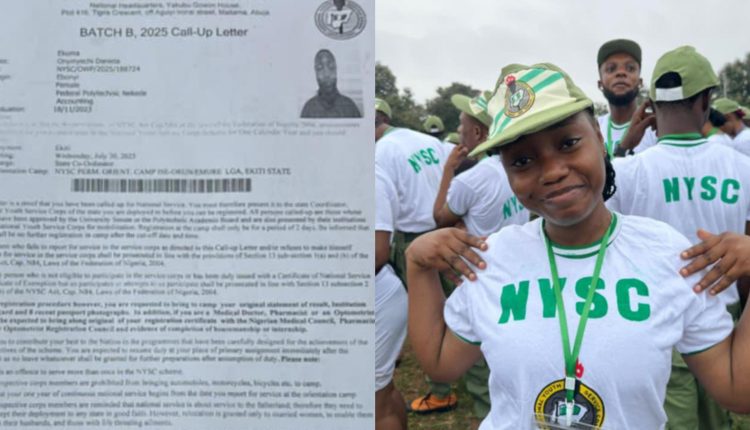How Corps Member Onyinyechi’s Arbitrary Arrest Mirrors Two-Year DSS Playbook
24-year-old National Youth Service Corps (NYSC) member Daniela Onyinyechi Ekuma had travelled from Ekiti, where she was serving, to mourn her grandmother.
On the morning of 21 August 2025, in Afikpo North, Ebonyi State, what should have been a solemn burial turned into a family’s nightmare.
24-year-old National Youth Service Corps (NYSC) member Daniela Onyinyechi Ekuma had travelled from Ekiti, where she was serving, to mourn her grandmother.
At about 4 a.m., men identified as operatives of the Department of State Services (DSS) stormed the family compound. Within hours, she was gone, first sighted at the Abakaliki office of the agency and later transferred to an undisclosed location. Since then, her parents have waited in dread and silence, shut out from any word about her condition or whereabouts.
The family’s ordeal is not unfamiliar. Over the last two years, similar scenes have played out in airports, villages, and even courtrooms across Nigeria. The DSS, established under the National Security Agencies Act in 1986 to handle intelligence and internal security, has developed a reputation for acting outside the clear provisions of the Constitution.
Section 35 of the 1999 Constitution guarantees that no citizen should be held longer than 48 hours without charge before a court. Yet in case after case, that rule has been treated as little more than a suggestion.
When Abdulrasheed Bawa, the suspended chairman of the Economic and Financial Crimes Commission, was picked up by the DSS in June 2023, he spent more than 130 days in custody without formal charges before he was quietly released.
Tukur Mamu, who once negotiated between terrorists and the government on the Abuja–Kaduna train abductions, has remained in DSS custody despite repeated court orders directing that he be granted access to his personal doctor.
Even Nnamdi Kanu, the leader of the nefarious Indigenous People of Biafra, has faced drawn-out disputes over access to his lawyers, with a Federal High Court in October 2024 threatening to jail the DSS Director-General for contempt if the practice continued.
The theatre of these arrests is not limited to hidden cells. In May 2024, operatives marched into a High Court in Ilaro, Ogun State, in defiance of a presiding judge and whisked away two defendants during a live session.
Lawyers and court staff looked on, stunned, as the security agency treated judicial authority as an obstacle rather than a pillar of democracy.
In August 2024, journalist Adejuwon Soyinka was briefly held at Lagos airport in what the DSS later described as a case of mistaken identity, while just a few weeks later, labour leader Joe Ajaero was intercepted by the agency at Nnamdi Azikiwe International Airport in Abuja.
These episodes at Nigeria’s air borders have reinforced the sense that no one, not even journalists or union presidents, is immune from being stopped, questioned, or detained without transparent cause.
Civil society has not been spared. In September 2024, the Socio-Economic Rights and Accountability Project accused the DSS of invading its Lagos office.
The agency countered with a claim of routine investigation and went further to sue SERAP for defamation. That case now sits before a Lagos court, its next hearing fixed for June 2025, showing how quickly accountability efforts can turn into fresh legal battles against the very groups trying to hold the state in check.
For Onyinyechi’s family, however, the debates about oversight and legal frameworks mean little. Each day that passes without information deepens their anguish.
They have joined the long list of Nigerians left in limbo, unsure whether to grieve or hope, their lives suspended by silence. For the DSS, “national security” has become an all-purpose phrase that shields acts of impunity from scrutiny. For citizens, it has become a synonym for fear.
The pattern is now unmistakable. Arrests often happen in the dead of night or at airports, followed by transfers to unknown locations. Families are denied access, lawyers are frustrated, and when courts intervene, compliance is partial or delayed.
Communities lose faith in the justice system, seeing courts themselves undermined. International obligations, from the African Charter on Human and Peoples’ Rights to the International Covenant on Civil and Political Rights, are repeatedly ignored.
If it can happen to a young woman in a NYSC uniform, it can happen to anyone. The story of Onyinyechi is therefore more than a personal tragedy; it is a mirror of how fragile liberty has become in Nigeria. Until the pattern is broken and the law reasserted, every family remains vulnerable to the same shadow that now hangs over the Ekumas.
Read Also: Abuja Police Detained Minor for Two Days over Abusive words


